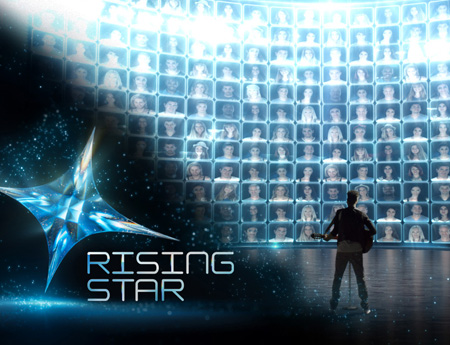Catch a ‘Rising Star’

The smarter way to stay on top of broadcasting and cable industry. Sign up below
You are now subscribed
Your newsletter sign-up was successful
ABC wants Rising Star to rise fast. The network announced in November that it had ordered 10 episodes of an American version of the hit Israeli unscripted music competition series from Keshet DCP. Then ABC Entertainment Group president Paul Lee set an ambitious goal for the show during his TCA winter press tour executive session this month. “We’re going to use the NBA to launch it in June,” when the NBA Finals air on ABC, Lee said, “and we’re very excited about it.”
Paul Telegdy is also very excited. “I pray they try to launch it in June,” said Telegdy, alternative and late-night programming president for NBC Entertainment. “I know when they bought it. There’s no way they can make the show.”
Telegdy believes the window between now and June is too short to accommodate preproduction, casting and the countless steps that go into launching a successful network talent-search contest. But an expedited timeline is by no means the only challenge ABC faces as it preps the show. The show’s cornerstone—what it hopes will be its spinning chairs—is real-time voting via a smartphone app. Contestants perform behind a wall of monitors obscuring them from the live audience, and viewers at home who vote for the contestant will see their photos appear on the wall. Once a particular percentage of yes votes is reached, the wall rises and the contestant advances. “It’s almost like a modern-day Colosseum,” Lee said at TCA. Perhaps, but the show raises questions both about how far networks can take their love affair with “event” programming and how much life the music-competition drama has left in it.
Time After Time
“So there are different time zones in America?” That was Lee joking in response to a question at his TCA session about the biggest mystery surrounding Rising Star—how will ABC pull off live voting in four different time zones? Israel has just one time zone, so there is no precedent there for facilitating voting across multiple zones.
Lee floated two possible solutions at TCA. The first would have West Coast viewers watch and vote live for the performances on a digital platform without being able to see results. The second would have some candidates chosen by the Eastern time zone and others by the rest of the country. “Please don’t hold me to it, because we’re only just starting,” Lee said.
Another option would be for ABC to simply broadcast the show live in primetime across all four time zones. As the only network without an NFL broadcast on Sundays during football season, ABC could air the show at 10 p.m. Eastern on Sunday and 7 p.m. Pacific at any time of year. That strategy, however, would present numerous scheduling and marketing challenges. It would also complicate the show’s ability to generate ad revenue, because of the different audience composition from time slot to time slot—and there is no indication that ABC would consider it.
The smarter way to stay on top of broadcasting and cable industry. Sign up below
This Again?
The other question hovering over Rising Star is more existential than immediate—Twelve years after the series premiere of American Idol, are viewers still interested in music competitions?
For years the gold standard, Idol finished the 2012-13 season with a 3.8 average live-plus-sameday rating among viewers 18-49—down 27% from the previous season and down 49% from two seasons prior. The show’s 13th season debuted Jan. 15 to a 4.7 rating in the demo, down 22% from last year’s premiere. Fox’s other big music competition, The X Factor, finished its third and most recent season Dec. 19 with a 1.7 rating in the demo, down 38% from the previous season. Asked about the show’s future at his TCA executive session this month, Fox Broadcasting Entertainment chairman Kevin Reilly said he had made no decision on whether it would return for another season.
At NBC, the fifth and most recent cycle of The Voice, which wrapped up Dec. 17, held even with the previous cycle at 3.9 in the demo. But those cycles were both down 7% from cycle three and 20% from the show’s peak in its second cycle. (The most recent, fourth cycle of The Sing-Off, which wrapped Dec. 23 and benefited from a Voice lead-in for part of its run, experienced a 6% bump over its previous cycle.) ABC itself has had rough luck with music competitions—most recently with Duets, which rode an average 1.3 18-49 rating to its death in its first and only season in 2012.
Telegdy rejects Idol executive producer Trish Kinane’s assertion at TCA that “if you look at the ratings, American Idol still beat” The Voice. “There’s no metric by which that’s the case,” he said. Actually, Idol and The Voice both have some bragging rights: Idol’s 12th and most recent full season averaged a 3.8 in the demo and 13.2 million total viewers in liveplus- same-day; cycle five of The Voice, meanwhile, averaged a 3.9 with 12.8 million viewers in live-plussame- day. So The Voice wins in the coveted demo, while Idol—which has been on TV for 12 years and peaked in the 2005-06 season with an average 12.4 rating in the demo—leads in total viewers.
But, as much as Telegdy might like to see Rising Star fall, he doesn’t believe that audiences are experiencing music-competition fatigue. “I think that these shows, when they’re done well, are really entertaining and people love them,” he said. Asked if he’s in the market for one, he added, “We never say never to anything. When we first did The Voice, people looked at me like I’d sprouted another head. ‘What are you, crazy?’ But if I had a prediction, there will be another big show.”
